Let’s Eat Grandma: “Writing music was an important part of the grieving process”

Two Ribbons, the new album from Jenny Hollingworth and Rosa Walton, is a sparkling, life-affirming set of songs bringing light to darkness and celebrating a lifelong friendship.
Music
Words: Craig McLean
Live photography: Phoebe Fox
On the stage of the hometown arts centre they first played when they were 15, Let’s Eat Grandma are performing a nine-song set that starts with fireworks and ends, via wet eyes and throat lumps, with 11-minute fan-favourite Donnie Darko, the throbbing electronic wig-out that’s the closing track from their last album.
Jenny Hollingworth and Rosa Walton open with new song Happy New Year. It’s a euphoric synthpop bop that celebrates the pair’s deep-tissue connection (“You know you’ll always be my best friend”) but also wittily hints at friction (“Just think, if we’d have been together, we’d be breaking up /I said, ‘I’d want the synth, and what a thing to say’”).
Thankfully, the mid-song sound of rockets, Roman Candles and Catherine Wheels suggests friendship won the day.
The emotions are coloured in darker hues on Watching You Go. Arms and eyes raised, Hollingworth sings to the rafters: “And I said to you, I’m not staying in, I’m not wasting it… but I was watching you go”, that last word and note drawn out to the heavens. Even if you don’t know what it’s about, it’s heartbreaking.
This friends-and-family show at Norwich Arts Centre is these multi-instrumentalists and co-vocalists’ first gig in three years, and the first in support of their third album. It’s called Two Ribbons and comes four years after its predecessor, I’m All Ears, a propulsive art-pop gem that was part-produced by SOPHIE. Hollingworth and Walton are still only 23 and 22 respectively, but they’ve lived some lives in that intervening period.
For one thing, there was the fraying of their relationship. This wasn’t the usual friends-in-band-drift-apart or guitars-out-of-the-pram fall-out. Nor was it the high drama of creative differences or rock’n’roll burn-out. For these women who’ve been fast and tight friends since they were four, it was deeper, more abstract and more difficult than that.
Even now, they can’t seem to express it. It’s not, they agree, as if they weren’t speaking.
“We kind of were because we had to work together,” says Walton.
“It was never like me and Rosa having a shouting match, or me and Rosa want to split the band up, or me and Rosa don’t want to talk to each other,” says Hollingworth. “We’re both just very emotional people. And there was something between us that was really painful. And we were both just trying so hard to connect to the other person. But it almost made it worse. It’s not like somebody that you fight with and then you’re annoyed at. It’s almost like: we’re hanging on for dear life!”
Those fissures were opening up as Let’s Eat Grandma – the band they formed in adolescence, that’s occupied almost half their lives – toured 2018’s I’m All Ears, the follow up to their 2016 debut I, Gemini, released when they were 17. They can’t have been helped by Walton leaving Norwich in spring 2019, to live in London with her then-boyfriend. Then, as lockdown hit a year later, Walton split with her partner and moved back to her parents’, now publicly acknowledging her attraction to women. As she sings on Hall of Mirrors, another new track performed tonight, “there wasn’t a girl that had made me shy until I talked to you”.
Throughout this period, Hollingworth had also been dealing with a lot. Her boyfriend, Norfolk musician Billy Clayton, was ill with Ewing’s sarcoma, a rare form of bone cancer. He died, aged 22, in March 2019. Let’s Eat Grandma cut short their touring commitments for I’m All Ears, but not before performing that April at Coachella, in part because that was something Clayton had always wanted to do.
“I’m definitely glad we did those shows,” reflects Hollingworth, quietly. “It’s hard, though, because I was on autopilot a bit. Just because I felt so… completely out of it.”
“It was so soon after Billy died,” nods Walton. “A few weeks after. That was weird, even for me – I can’t even imagine how it was for you.”
“I don’t think I even realised that he was actually dead,” says Hollingworth. “You know it, but you don’t feel it emotionally for quite a long time. I’m glad we did the shows. I can remember doing them, but it feels like that wasn’t me.”
Performing Watching You Go – her tribute to her boyfriend and also her commitment to embracing (“not wasting it”) life – on stage in Norwich Arts Centre, Hollingworth looks completely out of it in a wholly other way. As if she’s far from here, wrapped in her memories.
As if she’s remembering what it took for her to get here. As she’ll say at one point during our conversation, as we discuss the lengthy gap between albums: “We took the break for personal reasons because, to be honest, I was having a breakdown.”
The afternoon before the show, I sit down with Jenny and Rosa – first names from now on – in the otherwise empty café of the Arts Centre. I met them in Norwich four years ago, before the release of I’m All Ears and, for all the challenge and change they’ve been through in the intervening period, they’re as brilliant now as they were then.
Rosa wears a thrifted fake fur coat, mum jeans and a vintage skate t‑shirt. Jenny wears an emerald green dress. Each finishes the other’s sentences, or interjects with an encouraging “yeah!”, and happily gabble over each other in their Norfolk accents (Rosa’s stronger than Jenny’s) for the duration of our conversation.
As we talk, both tend to address their answers to my questions back to each other. We all drink tea, unpeeling the magic of Two Ribbons, a record they wrote separately and together, and that they co-produced over two years with David Wrench (who’s also worked with their Transgressive Records labelmate Arlo Parks), in his East London studio. It’s a nakedly honest, deeply moving, defiantly bright album about broken hearts, raw grief, female friendship and getting through things, together.
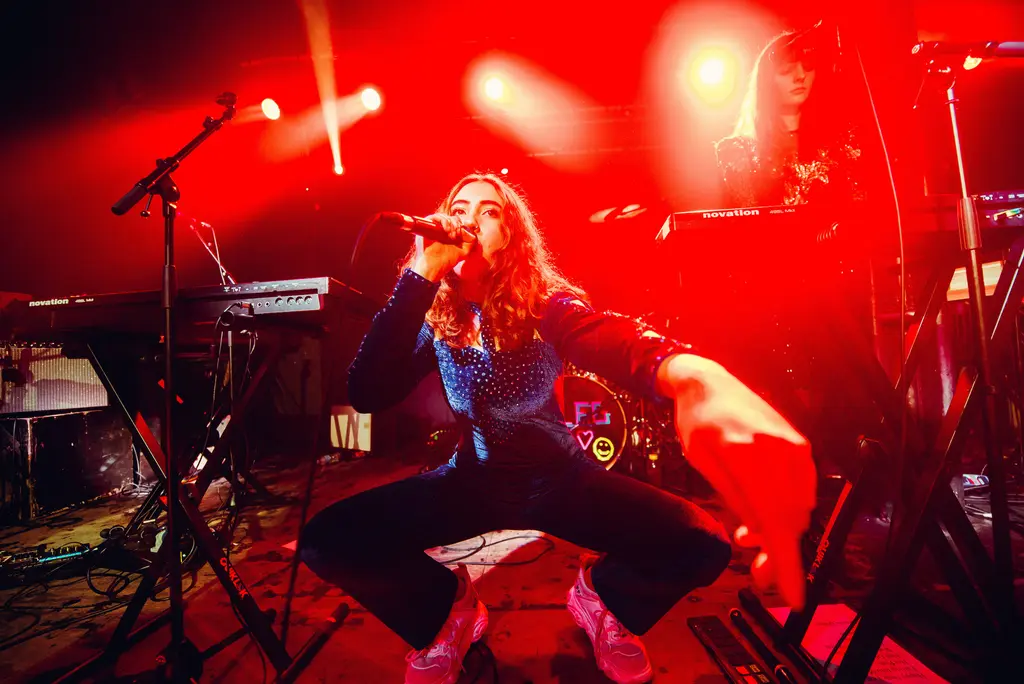
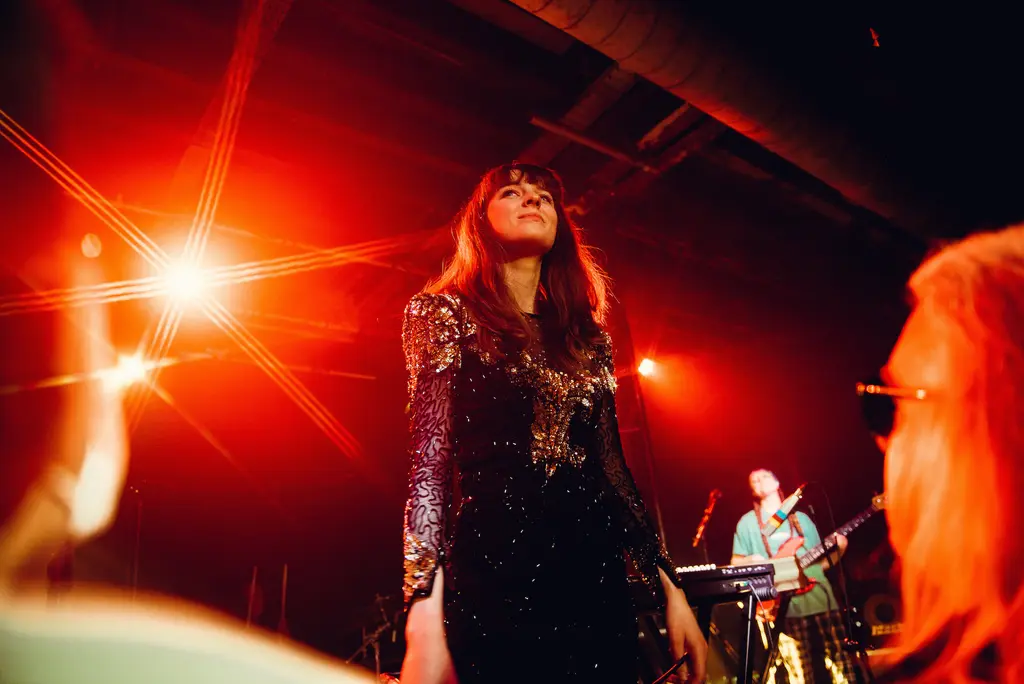
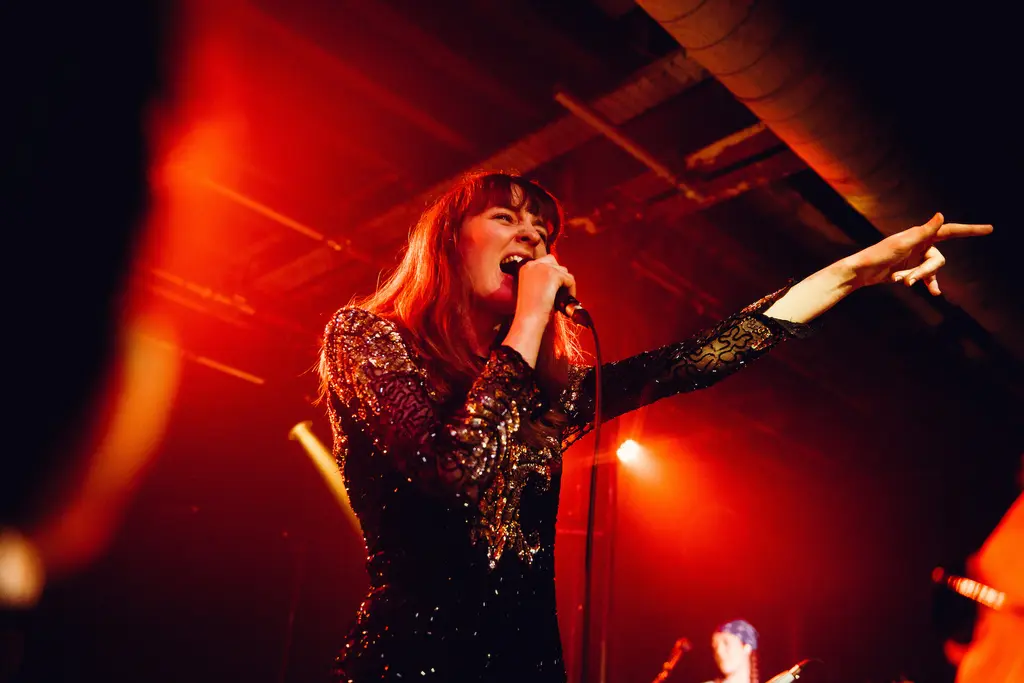
This venue has also hosted Nirvana and Ed Sheeran in its time. What were the 15-year-old Let’s Eat Grandma who played here like?
Rosa: Hair down to our waists and [styled] the same. We’d wear the same outfits. We were definitely a lot shyer. High-pitched mouse voices. Playing an old Yamaha keyboard, which was the school’s. Quite weird – we were quite weird kids.
Jenny: I think we’re still weird. Not like: “I’M A WEIRDO!” – we’ve always been different people who complement each other, but I don’t think we could see it as much then.
Rosa: We had the safety of the other person – we were tied together. That made us both stronger in a way. Now we’re more our individual selves. And that’s right for now. When you’re 15, it’s a bit scary putting yourself out in the world. But if you’ve got somebody who looks exactly the same as you there as well, it makes it a bit easier!
Melodically and rhythmically, Two Ribbons is brilliant. To pick but one track: your new single Levitation is like classic New Order (produced-by-Stephen Hague period). Broadly: did you want to have a more dance- or club-friendly sound on this album?
Rosa: Actually, that’s one of the things I thought about quite a lot at the end of touring I’m All Ears. I was like: I really want to write a song that would be really good in a DJ set. For some reason, that was one of the goals that I had. So I worked quite a lot on drum beats and basslines after that. I think that’s where some of the danciness came from.
Was previously working with SOPHIE an influence?
Rosa: Definitely. SOPHIE’S been a major influence on both of our songwriting in general, because we started working with her at quite an integral point, which was at the beginning of the last record. She was our introduction to pop music in a sense. Some of the pop songs that we wrote with her were like the first pop-structured songs. Obviously, we had some aspects of that on our first record, but not in the same way.
The way that she talked about sound in a visual way was quite inspiring. We’d be in the studio and she’d refer to something as “bubbles”, like: “Yeah, that’s bubbles!” And the metal clangs, which she kind of invented, I guess. Some of it was literally just from her hitting things. Or slamming car doors. Everything is a sound! For example, we recorded Jenny’s washing machine, just for fun.
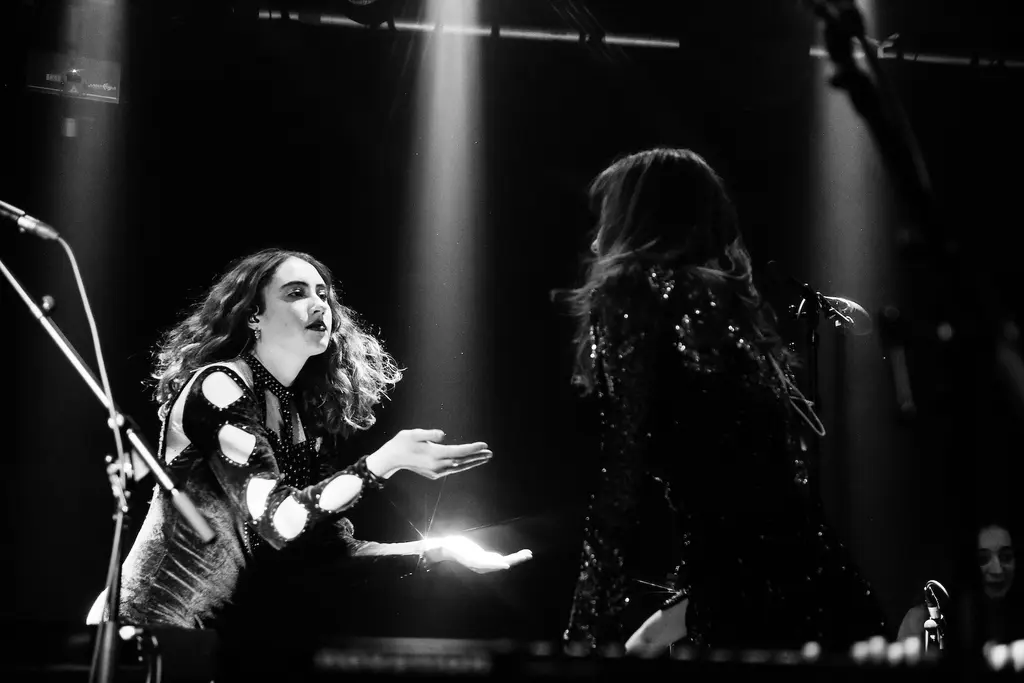
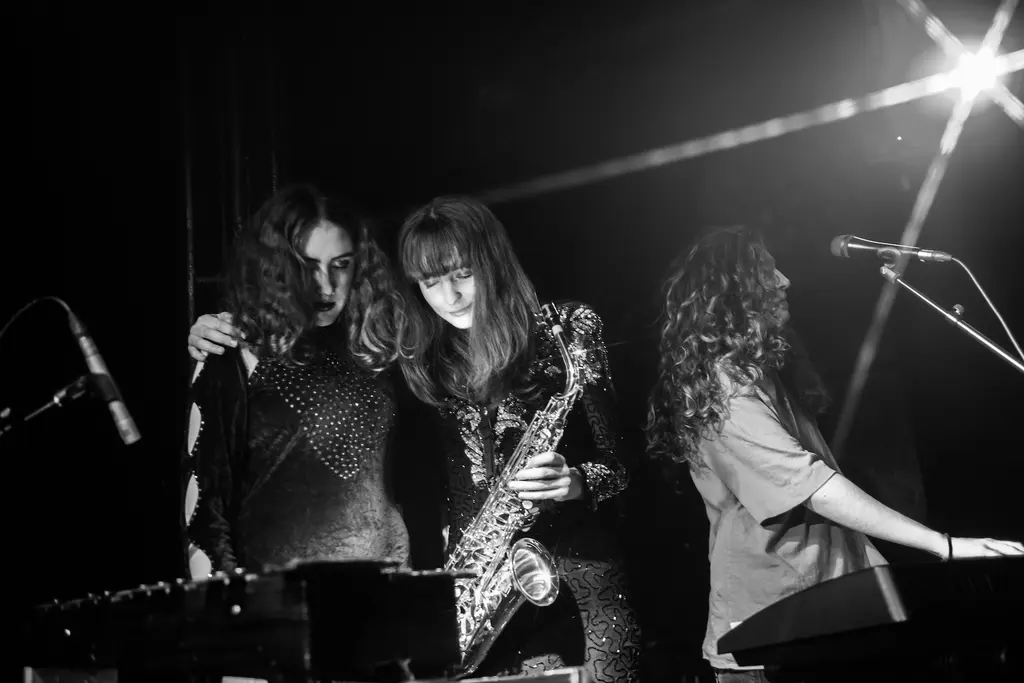
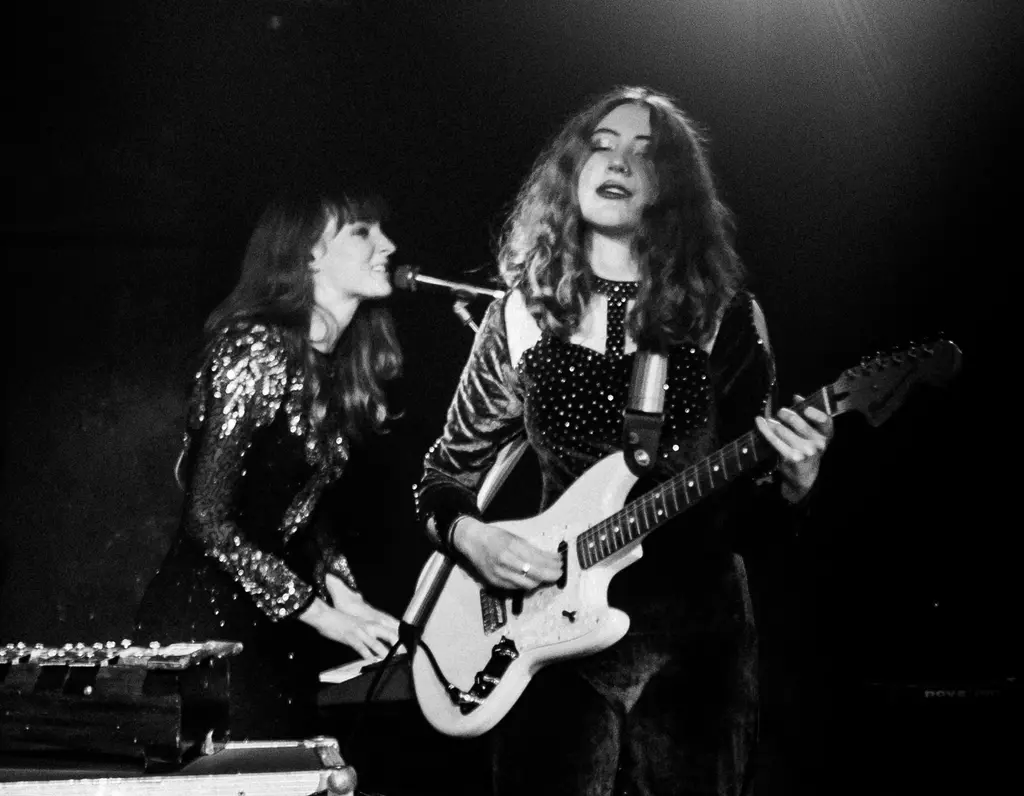
Then, speaking lyrically and emotionally, overall it feels like you’ve poured everything of yourselves into this album.
Jenny: I really appreciate you saying you can hear what we’ve put into it emotionally. That’s the thing that feels really integral.
The album opens with Happy New Year, a song Rosa wrote for Jenny. What’s the importance for you, Rosa, of having that song at the start?
Rosa: Our friendship’s always been one of the most important parts of the band. That’s what the band was based off in the first place.
Jenny: You know when you see old couples together and they just sit next to each other, facing everything else? That’s like me and Rosa’s friendship.
When it was bad between you, how did the badness manifest itself?
Rosa: We were touring for parts of it. We knew that we had to keep seeing each other pretty much every day. That’s also when that tension builds up and you start assuming things about one another. And that just builds and builds and makes it worse.
Jenny: It was really hard for us because we’re so close – we have quite a sisterly bond. Also, we don’t view music as work, really, because it feels like a calling… which sounds really hilarious, cliché and funny. But it doesn’t feel like I can separate it from the rest of my life. It’s a lifestyle! Oh my God! I’m just imagining that quoted, like, really dry!
Rosa, there seem to be two songs on the album that came from your time in London, Hall of Mirrors and Sunday. Is the latter about your break-up?
Rosa: I started writing the song before we actually broke up. It was almost as if I was writing it to process those feelings as if we had broken up, to prepare myself. So I literally wrote that in our shared bedroom in the times where he would be at work or whatever. I’d just be sitting crying writing these really sad lyrics.
But writing the song was something I could cling on to, that I could do with these feelings. I always think with songs, it’s sometimes [the case that] something comes out in the subconscious first before it happens in life.
Jenny, I’m guessing you couldn’t rush things either?
Jenny: I particularly needed quite a lot of time out [before the album]. I felt under quite a lot of pressure. Not necessarily because anyone was actually saying I was under pressure, but being in a band, I felt like I was letting everyone down if I took my time like processing Billy’s death, which was really quite difficult for me. The record took quite a long time because of that, because I wasn’t ready to be recording or writing for a long time.
“When you’re going through really intense emotional experiences, grief or any traumatic event, it makes people feel very isolated. And you can’t really communicate how you feel. But music, either through other people’s music, or through their own writing, makes people feel understood”
JENNY HOLLINGWORTH
Jenny and Rosa were introduced to Billy Clayton in 2017 by a mutual friend who knew they all liked PC Music. For Jenny, that connection was foundational – music is such an important part of her life, it’s natural that it finds its way into her relationships with many people.
She describes Clayton’s music as “almost like pop music, very electronically led”, but with a Gothic darkness to it. His voice was often compared to that of Marc Almond of Soft Cell, which Jenny can definitely hear. Also a talented photographer who “lived his life in an artistic way”, she found him inspiring and interesting to be around, their kinship artistic as well as emotional.
On Watching You Go, the lyrics and the picture you paint are very powerful. That must have been very hard to write, and to sum up everything you were feeling.
Jenny: Yeah, completely. I wanted every line to sum everything up perfectly. It felt like quite an emotional weight, to try and get that right.
For me, writing music about everything that happened was an important part of the grieving process. It gave me a voice – I don’t want to sound cliché, but when you’re going through really intense emotional experiences… grief or any traumatic event, it makes people feel very isolated. And you can’t really communicate how you feel. But music, either through other people’s music, or through their own writing, makes people feel understood. It gives them a way of expressing what is difficult to put only in words.
Is there a lyric that was the starting point?
Jenny: Oh, interesting. I guess these lines for the chorus and the build just came out naturally: “So I said to you I’m not staying in, I’m not wasting it…” And the simplicity of “I was watching you go” – that seemed to come out every single time I was thinking about it. And then the rest of it is built over time… agonisingly!
Hall of Mirrors, Rosa: there are images of you on the London Overground and seeing a girl who makes you feel shy for the first time. How revelational was it to you to have that feeling seeing another girl?
Rosa: Oh, yeah, very revelational! The song is about the years of experience since I figured out my sexuality in relation to being attracted to women. So it’s all of those experiences put into one song – it’s not literally about seeing somebody on the Overground. The Overground is more about the vastness of London, and how you feel everything’s so overwhelming. So it’s the idea of kind of thinking about somebody to escape from that. To escape from feeling alone in this massive city. And how the brain does that as escapism.
“Alongside our friendship, the idea of being in touch with complex and really difficult truths underpins a huge amount of our music”
JENNY HOLLINGWORTH
Let’s Eat Grandma will be touring this year, Jenny and Rosa now supported onstage by two additional musicians for the first time. That sisterly bond, now with back-up. Backed up, too, by an album that began with a lifelong friendship unravelling, but ends with it wound tighter than ever.
Two Ribbons is the last track, too. We might alternatively call it The Ballad of Jenny and Rosa, with its direct lyrical poignancy: “’Cause I haven’t thought for weeks of anyone but you /And I wanna find the answer /I just want to be your best friend /Just like it always was /Just like it always was.”
What does using the song, and the image of two ribbons, as an album title signify?
Rosa: The two ribbons could be me and Jenny, or it could be Jenny and Billy, or me and my ex-boyfriend. Two people who are woven together, but also like separate things. And I really like it in terms of the delicacy. It talks about relationships, and the give and take in relationships.
Jenny: In our music, the words “delicacy” and “fragility” keep coming up a lot. That toughness as well. What makes us who we are and as a band is not only our relationship with each other, but it’s also our willingness to be vulnerable. That’s quite important in the record… Alongside our friendship, the idea of being in touch with complex and really difficult truths underpins a huge amount of our music.
Rosa: I like the way you managed to get the word “translucent” into a lyric!
Jenny: I particularly like the line, “I’m bound to two worlds that I can’t be a part of”. That feels like one of the most pertinent lines in the song.
Could you unpack that please?
Jenny: It’s good for it to be open to interpretation because there’s definitely layers to it… It’s like the songs unfold to you as you write them. But the image of the two ribbons is not only about me and Rosa and our lives, and also other key relationships we have, like me and Billy. It’s also so much about duality, this record. Life and death, delicacy and toughness, hope and destruction.
When I met Let’s Eat Grandma in a vegan café in Norwich in early 2018, on a bitter winter’s day as the “Beast from the East” storm swept East Anglia, we ended our conversation with a simple question: how would Rosa describe Jenny in three words, and vice versa?
Today, Rosa remembers that, and how Jenny answered: “Struggles with politeness.” To be fair, this mild cuss was in response to Rosa describing Jenny as an “absolute massive twat”.
Four years on, I ask the same again, but let Jenny go first this time.
Jenny: My best friend.
Rosa: Absolutely lovely twat.
Levitation (Transgressive) is out today. Two Ribbons is released on 29th April







